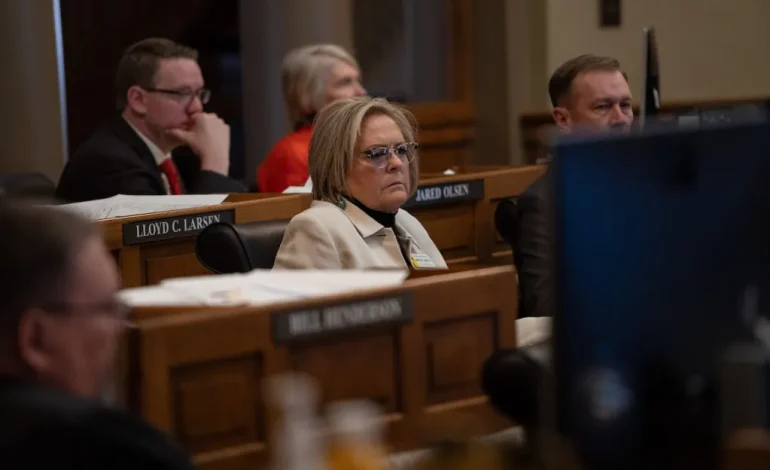As Wyoming awaits a Supreme Court ruling on its two contested abortion bans, Republican and Democratic lawmakers are preparing to introduce a new wave of abortion-related bills in the upcoming 2025 general legislative session, Wyo File reports.
The legislation reflects Wyoming’s ongoing divide on abortion rights. Republican lawmakers are focused on tightening regulations, including new rules for abortion clinics and a requirement for ultrasounds before medication-induced abortions. Meanwhile, Democratic lawmakers are crafting a bill to enshrine abortion access into state law.
The renewed push comes after Teton County District Court Judge Melissa Owens ruled on November 18, 2024, that Wyoming’s near-total abortion ban and its ban on abortion medications violated the state constitution. Judge Owens argued that the bans infringed on the constitutional right to make personal healthcare decisions.
The Wyoming Attorney General’s Office has since appealed the ruling to the Wyoming Supreme Court, where the fate of the two abortion bans now rests. While the appeal is pending, lawmakers from both sides of the debate are moving forward with new proposals for 2025.
Among the bills to be introduced is a proposal from Rep. Martha Lawley (R-Worland) to regulate abortion clinics that perform what the bill refers to as “surgical abortions”, though the American College of Obstetricians and Gynecologists (ACOG) classifies them as “procedural abortions” since they do not involve surgery.
Rep. Lawley’s bill would require abortion clinics to be licensed as ambulatory surgical centers, subjecting them to additional inspections, health department regulations, and oversight. It would also mandate that clinic doctors performing procedural abortions have admitting privileges at a hospital within 10 miles of the clinic.
These changes would directly impact Wellspring Health Access in Casper, the only reproductive health care clinic in Wyoming that offers procedural abortions. The clinic, which was famously set on fire before it opened, is also a plaintiff in the ongoing lawsuit against Wyoming’s existing abortion bans.
“As long as abortion is legal in Wyoming, we need to have some regulation of it,” Lawley said. “We really have not done a lot of regulation of abortion in Wyoming.”
Lawley’s bill is similar to one she introduced in 2024, but this version omits several controversial amendments that Governor Mark Gordon cited when he vetoed the original bill. One of those amendments — a requirement for ultrasounds before medication-induced abortions — will reappear as a separate bill sponsored by House Speaker-elect Rep. Chip Neiman (R-Hulett).
Rep. Neiman confirmed he plans to introduce the ultrasound bill in the 2025 session, though the full text of the proposal has not yet been posted on the Wyoming Legislature’s website.
Governor Gordon had previously signaled support for Lawley’s original version of the abortion clinic regulation bill, calling it a “simple and elegant solution” to abortion oversight. In his 2024 veto letter, however, he urged lawmakers to avoid unnecessary amendments, which he said would complicate ongoing litigation over abortion rights in the state.
While Republican lawmakers push for tighter regulations, Wyoming Democrats are preparing to reintroduce the Wyoming Reproductive Freedom Act, a bill aimed at protecting access to abortion and other reproductive health care services.
The measure, which was previously introduced in 2024, would enshrine the right to make personal reproductive health care decisions in Wyoming law. It would specifically guarantee:
- The right to access birth control and abortion care.
- Freedom from government interference in reproductive health care decisions.
- A ban on “unauthorized abortions” by non-medical professionals.
- Restrictions on unnecessary regulations that are not “medically necessary to protect the life or health” of the person seeking an abortion.
Rep. Karlee Provenza (D-Laramie), a leading sponsor of the Reproductive Freedom Act, said the bill ensures that “women need to be free to make health care choices without the interference of the government.”
The Wyoming Democratic Caucus echoed these concerns in a press release, warning that the state’s ongoing restrictions on abortion access could drive medical professionals out of Wyoming.
“Continuing efforts to interfere in health care could make it difficult for the state to attract and retain young families,” the statement read.
The bill also reflects growing concerns among medical providers in Wyoming, who have expressed fears that increased restrictions on abortion access could limit their ability to provide other critical reproductive health care services.
At the heart of Wyoming’s abortion debate is a provision in the state constitution that protects individuals’ rights to make their own health care decisions. This clause was a key factor in Judge Owens’ decision to strike down the two existing abortion bans.
Despite calls from some conservatives to amend the constitution, Republican lawmakers have not yet introduced a proposal for a constitutional amendment. According to Rep. Martha Lawley, it’s possible that this step could be taken later, but not until after the Wyoming Supreme Court rules on the case.
“That may ultimately happen, but I don’t expect a decision to be made on that until the Supreme Court of Wyoming rules,” said Lawley, who is also a retired attorney.
Rep. Mike Yin (D-Jackson) suggested that Republicans are avoiding a constitutional amendment because it would be unpopular with the public.
“The freedom of health care access is broadly important to most of Wyoming,” Yin said. “A constitutional amendment would fail, and they know that, which is why they don’t bring one.”
Polling by the University of Wyoming underscores this point. A recent survey found that only 10% of Wyoming residents support a total abortion ban, while 31% support abortion restrictions that include exceptions for rape, incest, or when a woman’s life is in danger. About 20% favor broader exemptions, while 39% believe abortion should remain a personal choice.
The Wyoming Legislature’s 2025 general session begins on January 14. Lawmakers from both parties have indicated they will introduce a flurry of new abortion-related bills, setting the stage for a heated debate over reproductive rights.
Republican lawmakers are prioritizing bills that increase oversight of abortion clinics and add procedural hurdles, like ultrasounds before abortion medication. Democratic lawmakers aim to protect the right to abortion access, which they argue is critical to Wyoming’s ability to retain young families and attract medical professionals.
Meanwhile, the fate of Wyoming’s near-total abortion ban and its abortion medication ban lies with the Wyoming Supreme Court, which will review the Attorney General’s appeal of Judge Owens’ decision.









